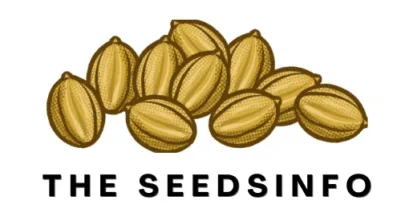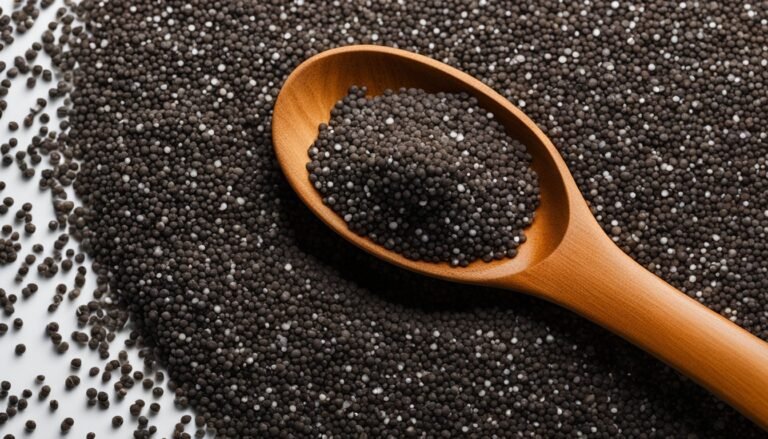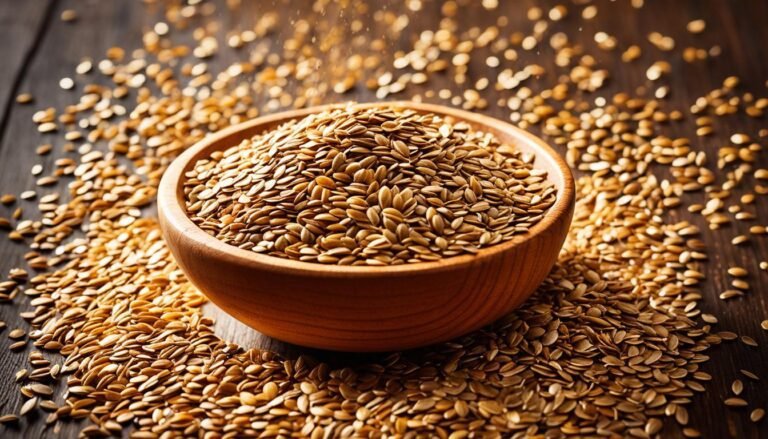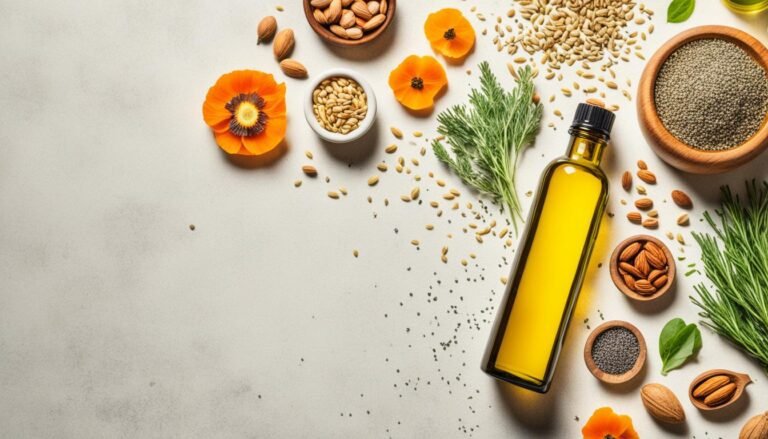Cinnamon Health Benefits for Male: Boost Your Wellness

Did you know cinnamon, a common spice in many dishes, can boost your health? Studies show it helps men in many ways, like controlling blood sugar and improving fertility and libido. Let’s dive into how cinnamon can make you healthier.
Key Takeaways
- Cinnamon can help regulate blood sugar levels, making it beneficial for men with diabetes or prediabetes.
- The antioxidants in cinnamon may protect heart health and reduce inflammation, lowering the risk of cardiovascular disease.
- Cinnamon has been shown to enhance male fertility and libido, potentially boosting sexual function.
- Consuming cinnamon may have cancer-fighting properties and help defend against infections.
- Cinnamon’s antimicrobial properties can improve oral hygiene and freshen breath.
Cinnamon: Nature’s Powerful Superfood
Cinnamon has been a favorite spice for centuries, loved by people all over the world. But it’s more than just a tasty addition to food. It’s a superfood, full of antioxidants and with a long history of health benefits.
Packed with Essential Antioxidants
Cinnamon is full of antioxidants like polyphenols. These protect your body from harm caused by free radicals. Eating cinnamon can boost your antioxidant levels and lower inflammation.
A Medicinal Spice with Ancient Roots
Cinnamon has been used for thousands of years as a medicine. In ancient Egypt, it was a rare and precious gift for kings. Today, there are two main types: Ceylon cinnamon and Cassia cinnamon. Both have unique health benefits, making cinnamon a great choice for your health.
If you want to increase your antioxidants, learn about cinnamon’s history, or just enjoy its flavor, cinnamon is a superfood. It should be a key part of your health routine.
Regulating Blood Sugar Levels
Cinnamon is a key player in managing blood sugar levels. It’s been studied for its ability to act like insulin. This hormone is vital for controlling glucose in the body.
Cinnamon Mimics Insulin’s Effects
Eating 1 to 6 grams, or about 0.5 to 2 teaspoons, of cinnamon daily can help those with cinnamon blood sugar benefits. It makes insulin work better, helping glucose get into cells. This leads to lower blood sugar levels and better cinnamon and insulin sensitivity.
A review of many studies found cinnamon can lower fasting blood sugar and improve long-term blood sugar control in type 2 diabetes and prediabetes. It could reduce hemoglobin A1c by 0.27% to 0.83% and fasting blood sugar by up to 52.2 mg per deciliter.
But, cinnamon’s effect on blood sugar can vary. It depends on the type, dosage, and individual factors. Some studies didn’t show much benefit. So, more research is needed to understand cinnamon’s best use for cinnamon blood sugar benefits.
Adding cinnamon to your diet or supplements, with a healthcare provider’s advice, might help manage blood sugar naturally. Always watch how you react and talk to your healthcare team for the best results.

Boosting Heart Health
Cinnamon is a spice with a long history that has been studied for its heart health benefits. It’s been found to lower the risk of heart disease, the top cause of death globally. Taking 1.5 grams, or about 3/4 teaspoon, of cinnamon daily can help lower triglycerides, total cholesterol, LDL (bad) cholesterol, and blood sugar in people with metabolic disease.
Cinnamon does more than just improve heart health. Regular cinnamon use for at least 8 weeks can also lower blood pressure. These effects can help reduce the risk of heart disease, making cinnamon a great addition to your health routine.
Cinnamon also helps with insulin sensitivity, which is good for the heart. It acts like insulin to control blood sugar levels, a key to a healthy heart. Studies show cinnamon can make the body more sensitive to insulin, helping with blood sugar control.
| Cinnamon Benefits for Heart Health | Dosage |
|---|---|
| Reduces triglycerides, total cholesterol, LDL (bad) cholesterol, and blood sugar | At least 1.5 grams (about 3/4 teaspoon) per day |
| Lowers blood pressure | Consumed consistently for at least 8 weeks |
| Improves insulin sensitivity | Varies, but can be effective in doses ranging from 1-6 grams (0.5-2 teaspoons) per day |
If you want to improve your heart health, think about adding cinnamon to your daily life. You can put it in your food or take it as a supplement. This spice could be a key part of your plan for a healthier heart.
Anti-Inflammatory Properties
Cinnamon is more than a tasty spice. It’s packed with health benefits, especially against inflammation. Cinnamaldehyde, an antioxidant in cinnamon, fights inflammation well.
Studies show cinnamon boosts antioxidants in the blood and lowers inflammation markers like C-reactive protein. This can reduce the risk of heart disease, diabetes, and some cancers.
The anti-inflammatory properties of cinnamon are great for people with conditions like arthritis or chronic pain. Adding cinnamon to your meals could help manage inflammation naturally.
Reducing Inflammation Markers
Cinnamon lowers C-reactive protein (CRP), a key inflammation marker. High CRP levels are linked to heart disease, stroke, and diabetes.
A 2011 study found that 1 gram of cinnamon daily for 12 weeks cut CRP levels. This shows cinnamon could help manage inflammation and lower disease risk.

Cinnamon also affects other inflammation markers like interleukin-6 and tumor necrosis factor-alpha. It targets various inflammatory pathways for a broad effect on the body.
Cinnamon health benefits for male
Cinnamon comes from the inner bark of Cinnamomum trees and has been used for centuries for its health benefits. It’s not just for cooking; it can also help men’s health. Research shows cinnamon can improve male fertility and libido.
Boosting Male Fertility
Cinnamon can boost male fertility in many ways. It helps increase sperm production and how well they move. This is key for fertility. Cinnamon’s antioxidants protect sperm from harm and reduce inflammation that can lower fertility.
Elevating Testosterone Levels
Cinnamon can also raise testosterone levels in men. This hormone is vital for sexual desire, function, and reproductive health. By boosting testosterone, cinnamon may improve libido and sexual performance.
How cinnamon affects testosterone isn’t fully known. But it’s thought to help by managing blood sugar and reducing inflammation. Both can affect testosterone levels.
Cinnamon’s antioxidants also protect cells that make testosterone from damage. This helps keep testosterone levels healthy.
Men wanting to improve fertility and libido might consider adding cinnamon to their diet or supplements. But, talk to a healthcare professional first to make sure it’s safe and right for you.
Potential Cancer-Fighting Abilities
Research is still ongoing, but cinnamon might have amazing anti-cancer properties. Studies on animals and test tubes show that cinnamon extracts can slow down cancer cell growth. They can also stop new blood vessels from forming in tumors, which could help fight cancer naturally.
Cinnamaldehyde, a key compound in cinnamon, seems to be a big player in this fight. Studies have shown that it can stop different types of cancer cells from growing. This includes cells linked to breast, leukemia, ovarian, and lung cancers.
Cinnamon also helps stop cancer cells from moving and can cause them to die. It has been found to work against cervical cancer cells. Plus, it can slow down the growth of blood cancer cells and lower the levels of certain cancer markers in skin cancer cells.
Cinnamon’s anti-cancer effects go beyond just fighting cancer cells. It can also stop the creation of new blood vessels in tumors. This is important because new blood vessels help tumors grow and spread.
| Cinnamon and Cancer Prevention | Findings |
|---|---|
| Sulforaphane in Broccoli | Reduced breast cancer cell size and number by up to 75% in a 2010 test-tube study. |
| Sulforaphane in Broccoli | Exhibited a 50% reduction in prostate cancer tumor volume in an animal study in 2004. |
| Cruciferous Vegetables | Analysis of 35 studies revealed a lower risk of colorectal and colon cancer with higher intake. |
| Carrots | Consuming carrots more than once per week reduced the likelihood of lung cancer in current smokers by three times, based on a 1986 study. |
| Beans | Increased consumption of beans was linked to a reduced risk of colorectal tumor recurrence in a 2006 study. |
| Berries | Rich in anthocyanins, berries were connected to a decreased cancer cell growth rate of 7% in a small study involving people with colorectal cancer. |
| Cinnamon Extract | Showed a decrease in cancer cell spread and induced cell death according to a 2010 study. |
Adding cinnamon and other cancer-fighting foods to your diet could be very beneficial. It might help prevent and manage some cancers. Always talk to your doctor to make a plan for your health and wellness.

Defending Against Infections
Cinnamon is a spice with a long history and many health benefits. It is known for its antibacterial and antifungal properties. This is thanks to the cinnamaldehyde compound, which has strong antimicrobial effects.
Antibacterial and Antifungal Properties
Studies in test tubes show that cinnamon oil can kill certain fungi and stop bacteria like Listeria and Salmonella from growing. It may also help keep teeth healthy by preventing decay and fighting bad breath.
At Swinburne University of Technology in Australia, researchers studied cinnamon’s antimicrobial effects. They found that a compound in cinnamon oil, called cinnamaldehyde (CAD), can break down tough bacterial biofilms. These are hard-to-remove communities of bacteria.
CAD can stop biofilms from forming and prevent bacteria from spreading. This is because it reduces a key molecule involved in biofilm creation.
This research could lead to new ways to fight skin infections. It shows cinnamon might be a natural way to combat infections.
Dr. Sanjida Topa talks about how natural products like cinnamon have been used to fight infections for a long time. With antibiotic resistance growing, cinnamon could be a new way to fight infections.
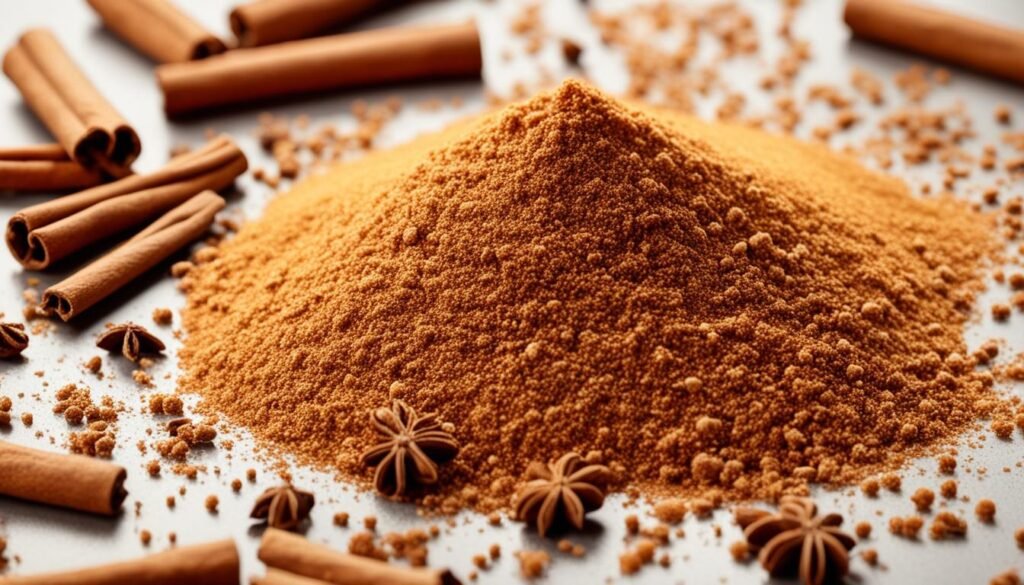
Improving Oral Hygiene
Cinnamon is more than just a tasty spice. It has a long history of helping with oral health. It fights bad breath and cavities with its antibacterial and antifungal properties.
Combating Bad Breath and Cavities
Cinnamon contains cinnamaldehyde, which stops bacteria that cause bad breath and cavities. Studies show cinnamon oil can fight Porphyromonas gingivalis, a bacteria linked to gum disease and bad breath.
Cinnamon also has anti-inflammatory flavonoids that soothe gum irritation and ease tooth sensitivity. Its calcium helps keep teeth strong by supporting bone health.
- Cinnamon’s antimicrobial properties help fight bad breath-causing bacteria
- Cinnamaldehyde in cinnamon stops bacteria that cause cavities
- Flavonoids in cinnamon reduce inflammation and tooth pain
- Cinnamon’s calcium supports strong, healthy teeth
Adding cinnamon to your oral care routine boosts dental health and freshens breath. It also lowers the risk of cavities and gum issues. This spice is a natural way to keep your smile healthy and bright.

Cinnamon is great for oral care because of its antimicrobial and anti-inflammatory effects. Using cinnamon can lead to a healthier mouth and better breath. It’s a natural choice over harsh chemicals in many oral products.
Unleashing Cinnamon’s Power
To get the most out of cinnamon’s health perks, learn how to add it to your daily life. Picking the right type of cinnamon and knowing how much to take is key.
For cinnamon lovers, Ceylon, or “true” cinnamon, is the top choice. It has less coumarin, which can be bad in big amounts. Aim for 1-6 grams, or 0.5-2 teaspoons, daily for the best effects.
Adding cinnamon to your meals is simple and fun. Try it in teas, baked goods, smoothies, or savory dishes. There are so many ways to incorporate cinnamon into your day.
When thinking about cinnamon supplementation guidelines, stick to the recommended amount. Always talk to a doctor, especially if you have health issues or take other medicines. Cinnamon can affect some drugs, so be careful.
| Cinnamon Nutrient Composition | Amount per 100g |
|---|---|
| Energy | 52 Kcal |
| Protein | 0.26 g |
| Fiber | 53.1 g |
| Vitamin A | 15 μg |
| Iron | 8.32 mg |
| Magnesium | 60 mg |
| Glucose | 1.04 g |
| Potassium | 431 mg |
| Sodium | 10 mg |
| Zinc | 1.83 mg |
| Copper | 0.339 mg |
| Manganese | 17.5 mg |
| Phosphorus | 64 mg |
By learning the best ways to use cinnamon and following cinnamon supplementation guidelines, you can fully enjoy this amazing spice. Experience its many health benefits.
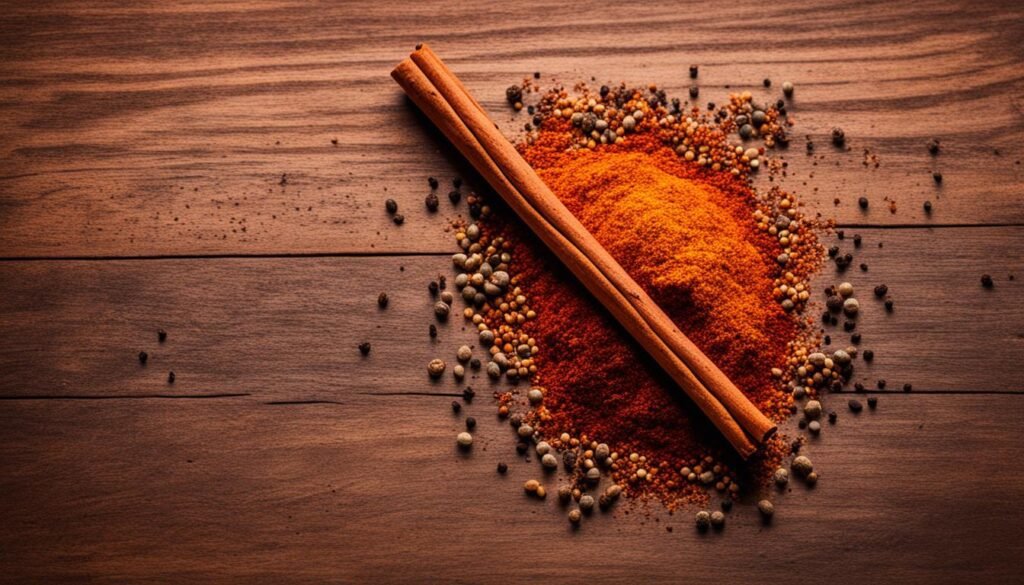
Conclusion
Cinnamon is a remarkable spice that’s great for your health. It helps with blood sugar, heart health, and even fights cancer. This spice is a natural way to keep you healthy and happy.
Adding cinnamon to your daily life can make a big difference. You can enjoy it in tea, water, or just sprinkle it on your food. It helps with blood sugar, reduces inflammation, and can ease menstrual symptoms. So, start using cinnamon to live a healthier life.
Cinnamon is a key ingredient for men’s health. It supports heart health and helps control blood sugar. By adding cinnamon to your daily routine, you can enjoy its many benefits. It’s a simple way to improve your health and well-being.
FAQ
What are the health benefits of cinnamon for men?
Cinnamon boosts male health in many ways. It increases sperm production and motility. It also raises testosterone levels and enhances sexual desire and function.
How can cinnamon help regulate blood sugar levels?
Cinnamon lowers fasting blood sugar and improves long-term blood sugar control. It acts like insulin, making it more effective and helping glucose enter cells better.
What are the heart health benefits of cinnamon?
Cinnamon can reduce the risk of heart disease. Taking at least 1.5 grams of cinnamon daily lowers triglycerides, total cholesterol, LDL (bad) cholesterol, and blood sugar in those with metabolic disease. It also helps lower blood pressure.
How does cinnamon help fight inflammation?
Cinnamon’s antioxidants fight inflammation well. Taking cinnamon supplements increases blood antioxidants and lowers inflammation markers like C-reactive protein.
Does cinnamon have any potential cancer-fighting properties?
Studies in animals and test tubes show cinnamon might protect against some cancers. Cinnamon extracts slow cancer cell growth and stop blood vessel formation in tumors, showing anti-cancer effects.
What are the antimicrobial and oral health benefits of cinnamon?
Cinnamon, especially cinnamaldehyde, fights off fungi and bacteria like Listeria and Salmonella. It also protects against oral infections and improves oral hygiene.
How can I incorporate cinnamon into my daily routine to maximize its health benefits?
Choose the right type of cinnamon (Ceylon) and take 1-6 grams or 0.5-2 teaspoons daily for best results. Add cinnamon to your diet with teas, baked goods, smoothies, and savory dishes.
